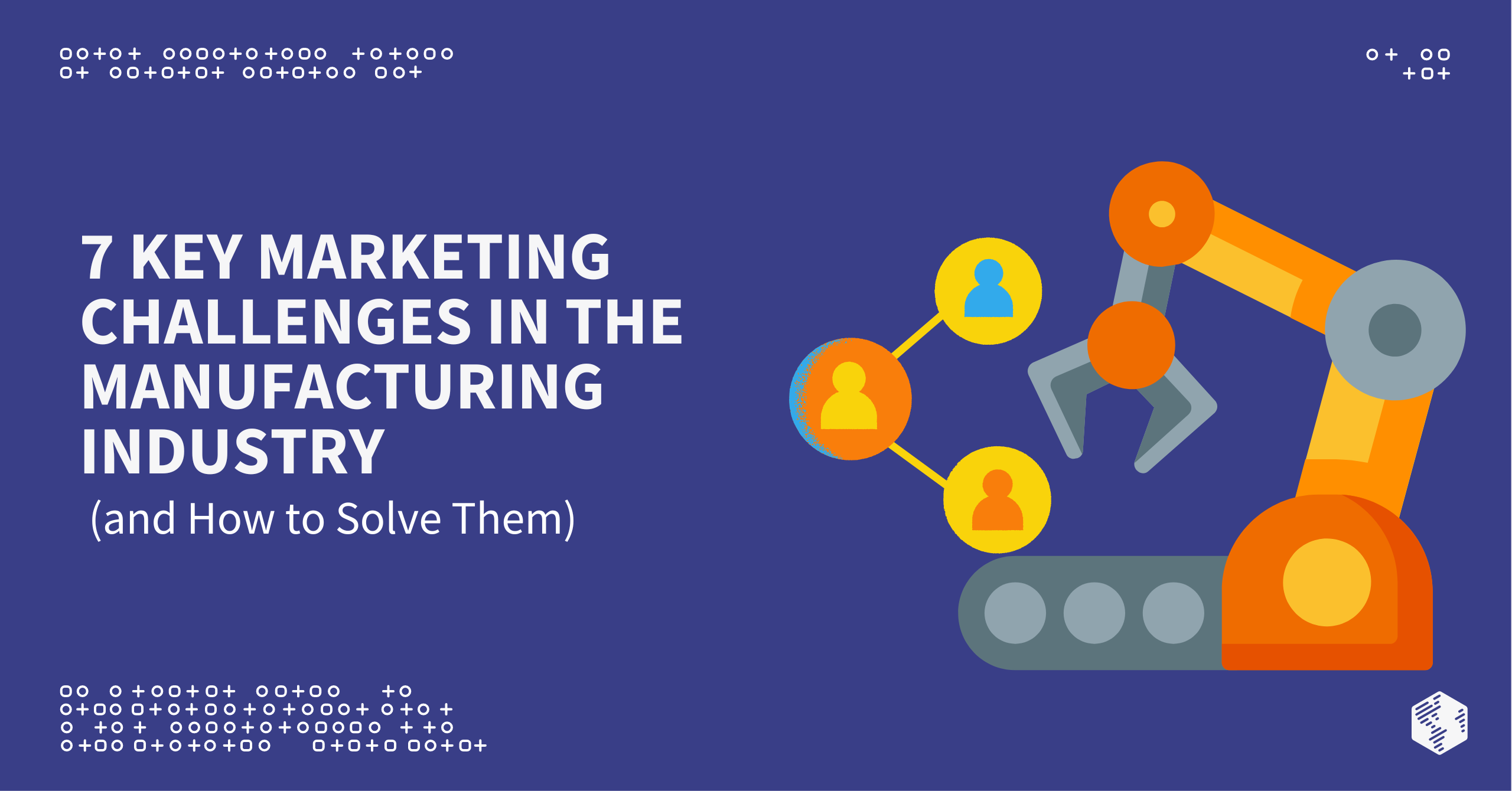Table Of Contents
Manufacturing is an industry that requires a specialized approach to marketing.
Why?
When it comes to developing and implementing a business-to-business (B2B) digital marketing strategy, manufacturers are faced with a unique set of marketing issues that can make it hard to successfully engage with prospective buyers, generate more leads, and increase sales.
It’s not an easy marketing landscape to navigate.
Fortunately, you don’t have to do it alone.
At OneIMS, we are experts in creating digital marketing strategies for manufacturing companies, and we can help you solve marketing challenges in the manufacturing industry.
In fact, we’ve created this guide to help you face these obstacles head-on.
Let’s get to it.
Challenge #1: Marketing Channel Optimization and Content Delivery Methods
Today’s customers are saturated with options for whatever they want to purchase, so you need to set your manufacturing company apart from the competition.
How?
The key to making sure prospective buyers are introduced to your company is by embracing a multichannel approach to marketing.
By providing options for content delivery, you will ensure your content is available to customers on as many channels as possible. Options are essentially endless and include a combination of digital and traditional marketing methods:
- Direct mail
- Traditional media (radio, television, etc.)
- Social media
- Paid search or PPC (pay-per-click)
- Webinars
- Blogs
- Landing pages
- Conferences
- Trade shows
- Word-of-mouth
To go even further, you need to optimize your marketing channels. Determine which platforms are working efficiently (see Challenge #6), focus your marketing efforts on those channels (see Challenge #3), and customize the content shared on those platforms to your targeted audience (see Challenge #2).
Challenge #2: Engaging with Prospects Throughout the Buyer’s Journey

You need to know who your target customers are in order to effectively tailor your marketing strategy to their needs. By defining who you are selling to, you can predict their purchasing behavior and focus your marketing efforts on connecting with them throughout the buyer’s journey.
The buyer’s journey is a way of breaking down a customer’s path to purchase. It’s an extremely powerful method of addressing the needs of prospective buyers.
There are three stages to the buyer’s journey—awareness, consideration, and decision—and each phase offers an opportunity to connect with prospects in a different way.
The Awareness Stage
In the first stage of the buyer’s journey, the buyer becomes aware of the problem they want to solve or challenge they want to overcome.
You can engage with prospects in the awareness stage by providing educational and informative content. Through targeted search engine optimization (SEO) efforts and PPC marketing, buyers will learn about your company and become aware of your options for solving their problem.
READ: How Manufacturing Companies Can Drive Predictable Growth in Uncertain Times
The Consideration Stage
The second stage of the buyer’s journey is when the buyer defines the problem or challenge and considers ways to resolve it.
Now is the time to invest in strong content marketing to help prospects research your products and services. Create resources like blogs and white papers that clarify how your company meets their unique needs.
The Decision Stage
Finally, in the last stage of the buyer’s journey, the buyer evaluates their options and decides on the best product, service, or solution to meet their needs.
This is when the marketing and sales teams come together to transform the prospective customer into a new lead. Make sure your selling position address the objections prospects might have as well as sets you apart from competitors so it’s easy for buyers to decide on your company.
READ: Digital Marketing for Manufacturers: An Ultimate Guide
Challenge #3: Insufficient Tools and Techniques to Attract and Manage Qualified Leads
After optimizing your multi channel content delivery methods and establishing a process to connect with prospects at every stage of the buyer’s journey, it’s time to take a look at how you attract and manage qualified leads.
What is a qualified lead? A prospective buyer who has engaged with your company’s marketing efforts and is (hopefully) ready to make a purchase.
Manufacturing companies can have a difficult time generating and nurturing qualified needs, but digital marketing provides new tools and techniques that B2B manufacturing companies can take advantage of in order to attract and manage qualified leads—for example, creating high-quality, SEO-optimized, and accessible content to help potential leads find your company as well as landing pages that convince buyers to take a specific action.
The important thing to keep in mind is that once you identify your prospective buyers and understand how they engage with your content, you can focus your efforts on the marketing channels and activities that successfully close leads.
Challenge #4: Unlocking Success in Digital Transformations
Many manufacturing companies are making the transition from traditional to digital marketing and operations. This digital transformation is a multi-faceted journey for any company, but it can be especially difficult for manufacturers to make the change because of the industry’s long history of conducting business in person.
To transform your manufacturing company into an industry-leading digital powerhouse, you need to adopt new technologies and take a holistic approach—in other words, ensure that the entire team, across all departments, is committed to working in new ways.
Manufacturing marketers especially have a hand in successful digital transformation efforts. It all comes down to data.
Adopting new digital tools means access to comprehensive data about marketing and sales campaigns as well as insights on prospective and current buyers. With this data at hand, marketing and sales teams can better connect with customers.
Challenge #5: Failing to Update Your Website
The power of an effective website is unmatched.
An accessible, engaging website is your biggest marketing tool because it is your hub for engaging with prospective customers, telling your story, showcasing your products, establishing your brand, and attracting new leads.
Digital marketing techniques like SEO and additions such as customized landing pages can further increase the marketing power of your website.
If the website of your manufacturing company is not functional, user-friendly, and informative, updating it is the very first step.
Challenge #6: Measuring B2B Marketing ROI
Effective B2B marketing requires data. Without it, you can’t measure the success of your digital marketing strategy.
Calculating the ROI (return on investment) of your marketing efforts is a way to determine if the revenue you have generated is worth the money you spent.
Marketing automation software and other analytical tools measure the results of your marketing campaigns and lead generation rates in order to highlight areas that performed well or those that need additional tweaking.
Challenge #7: Ignoring the Long-Term Effect of Marketing Strategy on Brand Sales
The relationship between marketing and sales is undeniable. Similarly, the long-term effect of your manufacturing company’s B2B marketing strategy on brand sales cannot be understated.
To successfully transform prospects into qualified leads, your sales representatives need to be able to provide customers with high-quality content that will encourage prospects to decide on your company among your competitors (see Challenge #3) and see how customers are interacting at early stages of the buyer’s journey so they know when it’s time to engage (see Challenge #2).
With the implementation of a digital marketing strategies, your marketing and sales teams feed information back-and-forth in order to transform prospective buyers into customers. A successful digital marketing strategy means that both your marketing team and your sales team have the information and resources they need to succeed.
How to Build a Marketing Strategy as a B2B Manufacturing Company
It doesn’t matter how good your product is or how beneficial your services are if customers don’t know about your company. That’s why building an effective marketing strategy is a critical part of increasing sales, generating new clients, and becoming a leader in the manufacturing industry.
The marketing challenges and solutions we’ve outlined today offer just a glimpse into the dynamic world of B2B marketing—both the good (how a digital marketing strategy can help your business thrive) and the bad (how ignoring these obstacles can stop growth in its tracks).
Fortunately, there are ways to transform your marketing strategy to meet these hurdles head-on and make your company more successful than ever. Unfortunately, these methods require time, resources, and expertise you may not have at hand.
Where do you start?
You have a few options.
To build an effective B2B marketing strategy in the manufacturing industry, you can take advantage of automated marketing tools and B2B inbound marketing software that is designed to streamline these processes, making it easier to create compelling content, get that content in front of prospective buyers, transform those prospects into customers, and analyze your marketing ROI.
For further help—or if you don’t have an experienced, dedicated marketing staff on hand—consider hiring a team of digital marketing experts to create solutions customized to your industry, company, and product. These professionals can recommend the best software options for your marketing needs and manage all aspects of your digital marketing strategy.
Building a strong, effective, and streamlined B2B marketing strategy is a long-term investment in your manufacturing business. Don’t forget this critically important part of doing business in the digital age.
Conclusion
Now is the time to find a B2B marketing solution that works for your manufacturing company.
If you’re ready to grow and invest in your business, we can help.
At OneIMS, we have the strategies, tools, and solutions your manufacturing business needs to engage with clients and reach your marketing goals. Our expert marketing team works with companies in a variety of industries to develop innovative and successful marketing solutions, and we pride ourselves on producing measurable and sustainable results.
We offer a variety of marketing services that can be tailored to your unique business needs:
- SEO services
- Content marketing
- Paid media management
- HubSpot management
- Reputation management & PR
- Website design & development
But you don’t have to take our word for it. View case studies from some of our happy customers and read our blog to get an idea of our training and experience.
Interested in learning more about how we can help grow your business? Check out our process or schedule a consultation with us today.






